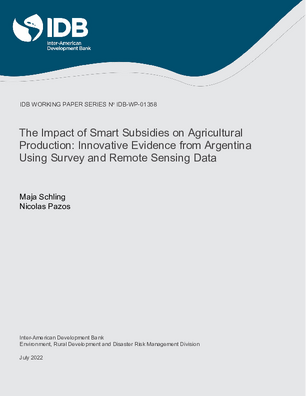The Impact of Smart Subsidies on Agricultural Production: Innovative Evidence from Argentina Using Survey and Remote Sensing Data
Date
Aug 2022
This study assesses the impact of the Program for Rural Development and Family Agriculture (PRODAF), a smart subsidies project that benefited the family farming stratum in northeastern Argentina. The evaluation draws on two complementary data sources. The first is a survey of agricultural households with a sample of 898 farmers (534 treated and 364 control) conducted after the end of the project. The second uses plot georeferencing to measure agricultural yields with satellite data for a subsample of 195 farmers over a 10-year period. Using the inverse probability weighting methodology, we find that PRODAF increased the technology adoption rate by 21 percentage points, and increased access to credit by 47 percentage points. Overcoming these barriers enabled the beneficiary farmers to increase the value of their sales and net income, although impacts varied among the four prioritized chains. In contrast, the analysis only detected a significant impact on yields for the citrus chain, which may be due to the type of technology adopted in this chain. Finally, we construct the Normalized Difference Vegetation Index (NDVI) to estimate productivity in the cotton and citrus chains. Applying the event study method, we confirm that technology adoption is a complex process whose full impact on yields only materializes between the second and third year post-treatment. We additionally confirm that the use of satellite data is an effective tool that accurately estimates yield changes and can be used to monitor and assess this type of intervention in real time and at a low cost.




